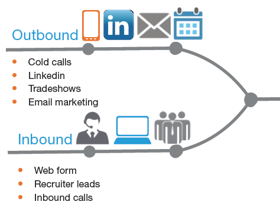The Real Reason Sales Role Play Fails—and How AI Role Play Fixes It
Yesterday, I hosted a live sales training call with a client’s sales team.

 No, it's not a trick question, but it is a tricky decision. If you're like many of our client's, you probably have a finite budget in which you can invest in sales tools and services to improve sales performance and meet your sales quota. You can invest by purchasing a list full of contact and company profile data or subscribe to a monthly service like Data.com, Linkedin, Discoverorg or Rainking to help your sales people reach the right decision makers. On the other hand you may be weighing this investment decision against a sales training investment. According to the 2014 MHI Research Institute Sales Performance and Productivity Study, the top two sales productivity investments sales teams made for 2014-2015 were improving product knowledge and market competitive intelligence (82%) and improving process, skills, or competency training (81%).
No, it's not a trick question, but it is a tricky decision. If you're like many of our client's, you probably have a finite budget in which you can invest in sales tools and services to improve sales performance and meet your sales quota. You can invest by purchasing a list full of contact and company profile data or subscribe to a monthly service like Data.com, Linkedin, Discoverorg or Rainking to help your sales people reach the right decision makers. On the other hand you may be weighing this investment decision against a sales training investment. According to the 2014 MHI Research Institute Sales Performance and Productivity Study, the top two sales productivity investments sales teams made for 2014-2015 were improving product knowledge and market competitive intelligence (82%) and improving process, skills, or competency training (81%).
At Menemsha Group we rely heavily on sales tools including salesforce.com, Hubspot, Charlie, Rapportive, and Linkedin to name a few. Heck, we're "sales geeks," you don't have to convince us of how important it is to empower your sales reps with the right tools. Our clients often ask us for our help and insight on not only what tools to invest in, but when to invest in those tools and for which reps. Here is how we help staffing industry sales leaders, CEO's and business owner's make this investment decision.
Do You Have a Clearly Defined Lead Qualification & Conversion Process?
The first thing you need to assess is your lead qualification and conversion process. In other words, do all members of your sales team have the same understanding of what a qualified lead is and how a lead gets converted and qualified? Simply having a list of IT professionals names and profiles with management oriented job titles and job functions doesn't mean they're qualified. You will need to have a lead qualifcation process established first in order to provide your sales team with clear operating instructions on what they are to do once they actually speak with the lead. What you don't want to do is populate your CRM/ATS with a bunch of unqualified leads and no ability to segment high value leads from low value leads and unqualified leads. You also don't want your leads mixed in with your pre-existing contacts. This will slow your sales cycle, not accelerate it. Mapping out your lead conversion process will prevent this and help ensure you optimize your sales data intelligence investment.
How Confident & Content Are You With Your Sales Team's Activity Level & Prospecting Output?
How content are you with the frequency in which your sales reps pick up the phone and make prospecting calls to new prospects? If getting your sales reps to make prospecting calls feels like asking a six year-old child to eat vegetables than this should be cause for concern. We've worked with many clients who have invested in sales data intelligence only to discover their sales reps activity levels were so low that the ROI couldn't be realized. Our experience from investing thousands of coaching hours with thousands of IT staffing sales reps tells us it takes 25 raw dials to connect with a decision maker over the phone. When considering your time to ROI you need to ask yourself the following questions:
Once you have the answers to those questions you can start to gain insight around how long it will take you to see a return on your sales data intelligence investment. More importantly, this exercise will give you greater clarity on the level of change you are asking your sales team and organization to take on. Let's assume your goal is to achieve an ROI within 180 days and to achieve that goal you will need your sales team to double the amount of daily outbound prospecting calls from 25 to 50 per day. Will this be realistic? Do you have a plan on how you will drive and sustain this change in behavior? Hopefully you can start to see that implementing a new sales tool is not as easy as just purchasing it and deploying it. It requires thoughtful planning and executive leadership modeling and sustaining the desired change in behavior.
Is The Data Accurate & Updated?
When considering sales data intelligence software (subscription service) it is important that you understand that the data quality is only as good as the person giving you the data. Do you know how sales intelligence software companies actually collect their data? They have a call center full of energetic sales reps making COLD CALLS into the exact same accounts your sales reps are calling into. Hmmm....that description sounds a lot like what a sales floor should look like for an IT staffing firm. The data accuracy is only as good as the questions these reps are asking and what those IT professionals are willing to share. I'm not suggesting the sales intelligence providers are intentionally sharing inaccurate data, but it's not like it is uncommon for sales people to unconsciously make assumptions and report inaccurate data. To manage your expectations you will need to "inspect what you expect."
If you're relying on the sales data intelligence provider to get you the data because you lack confidence in your own team's ability to get the data on their own than you probably have a much bigger issue on your hands and that brings me to my next point.
How Come Your Sales Reps Are Not Already Getting This Data?
CEO's and sales leaders need to seriously consider this question. Why can't my sales team glean this information from their own prospecting efforts? This is the most basic, lowest common denominator in all of sales. Having basic conversations with prospective customers and collecting information about their role in the company and responsibility, decision making process, current and upcoming projects and so forth.
Did leaders of IT staffing firms decide that sales reps no longer need to qualify accounts and that building institutional knowledge of their prospect and client accounts is no longer important? I don't think so. Spoon-feeding sales reps with the most powerful, real-time data however will do nothing to enhance their sales skills nor will it empower them with the ability to demonstrate credibility, build trust, qualify, convert and close prospects. It's like putting high octane gasoline in a Ford Pinto. It's a still a Pinto. And correct me if I am wrong, but I always thought sales reps get paid a base salary to:
So, why can't your sales reps get this data? Do they lack the skills to ask the probing questions? Do they lack the skills to get a prospect to open up and share information? Do they have call reluctance? Do they lack the methodology and messaging (or understanding of their buyers persona) for getting their phone calls and email messages returned? We have found that most reps do in fact lack these skills because they have been spoon-fed the data off a silver platter before demonstrating that they can get this data on their own.
On the other hand you may be considering investing in sales data intelligence software because your sales reps simply need more leads to call on. If this is your situation you most likely (I'm 98% confident on this) have hired the wrong sales people. If a sales person can't track down and figure out who the key decision makers are in an account (or create an account prospect list) they probably don't belong in sales (with the exception to 1st year reps only). And they certainly don't warrant your investment. Linkedin is free...plenty of people to call on, qualify and convert and close!
Do Your Sales Reps Understand How to Use The Data?
The primary purpose for investing in sales data intelligence software is not to provide sales reps with a list of names and profiles (this is available for free on Linkedin) but to arm sales reps with deep data intelligence including "trigger events" and other insights that they can reference in order to have a consultative sales conversation. We are big believers in this approach which is why it is part of our sales methodology. But here is the thing, we have worked with over 300 IT staffing firms and trained and coached thousands of sales reps in the industry and very few, less than 5% truly understand how to properly reference a trigger event in a sales conversation. This is one of the most common and popular reasons why clients come to Menemsha Group, to teach their sales team how to use this data and have business oriented conversations. Let me provide some context. Let's assume your sales data provided your rep with the following information:

Is your rep going to call this prospect and say "I understand you need to update your mobile apps, what staffing needs will you have?" Or, do they know how to use this information in such a way that they will strategically uncover pain points and share fresh insights with the prospect that will engage the prospect in a memorable. consultative sales conversation?
If the answer is the former than you really have to ask yourself, is my sales team really ready for sales data intelligence software? Is it really going to change the way they sell and shorten the sales cycle? Sales data intelligence is an excellent and a wise investment for the right sales team or right sales reps.
As I mentioned at the onset, we are big believers in sales data intelligence so I don't want you to think we're poo-pooing the idea. But before you invest in sales intelligence software you should really be sure of the following:
 How Menemsha Group Can Help You Maximize Your Sales Data Intelligence Investment
How Menemsha Group Can Help You Maximize Your Sales Data Intelligence Investment
Access to sales data intelligence software should be a privilege given to those who have earned it, are willing to take full advantage of it and understand how to maximize the data. Here are just a few examples of how our sales methodology and training benefits sales reps who have access to sales data intelligence.
The result for the staffing business owner, CEO or sales leader is not only an ROI but a much quicker ROI and an accelerated sales cycle.
If you need help trying to determine whether or not you should invest in sales training or sales data intelligence you can request a free consultation here, or click the button below.
How are you leveraging sales data intelligence? What have you seen that works? How is your sales team leveraging the data and what results have seen from your investment? Let's start a conversation in the comments section below.

Yesterday, I hosted a live sales training call with a client’s sales team.

1 min read
Most staffing firms don’t struggle to scale because their teams aren’t working hard. They struggle because they don’t have a real go-to-market...

In my previous post, How to Prevent Unexpected Contract Terminations, I shared how systemizing consultant and client check-ins at key milestones...